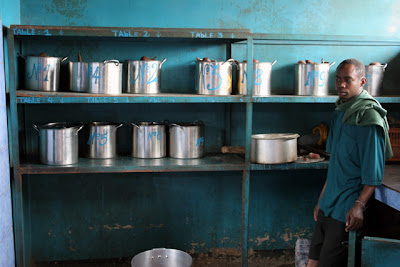So what the Hell am i doing in Rwanda? For the most part I'm still trying to figure that out. This post has to do with the part I have figured out. Baby steps.
I am part of a brand spanking new non-profit called the
Tiziano Project, named for a legendary Italian journalist. The overall goal of the project is to bring something like citizen journalism to Africa. We want to teach people here how to get information about themselves out to the rest of the world. In many ways Africa remains a dark continent, and up-to-date information can be hard to find.
The first project I'm working on is with the Gisimba Memorial Center, an orphanage in Kigali that has been around since before the genocide of 1994. Most of the older kids were orphaned during the genocide, but the younger kids are mostly AIDS orphans. Out of 185 kids 15 are HIV positive. Gisimba provides the kids with a place to stay, meals, and pays for them to go to school. Last week I spent a day with five Gisimba residents photographing the center and the surrounding neighborhood. For most of them it was their first time using a camera. For rookies they did a great job and took some amazing photos.
Check out their galleries and bios.Or stay here and check out the stuff I shot:

One of my students hard at work.

Back at Gisimba getting ready for lunch. The numbers on the pots correspond to numbers on the tables where the kids sit. All kids have an assigned table.

Cooking for 200.

Digging in.

This one's still growing.

Mmmmm... Mystery fruit. Don't know what they are, but they're sour and pulpy and have lots of seeds.

Kids at Gisimba pre-school. The pre-school is open to kids from outside the center for a fee. The fees help support the center.

Swinging at the pre-school.

Pre-school teacher for 4-5 year olds. She teaches both English and French but struggles because there aren't enough picture books for the kids.
Labels: africa, gisimba, kigali, orphans, rwanda



































